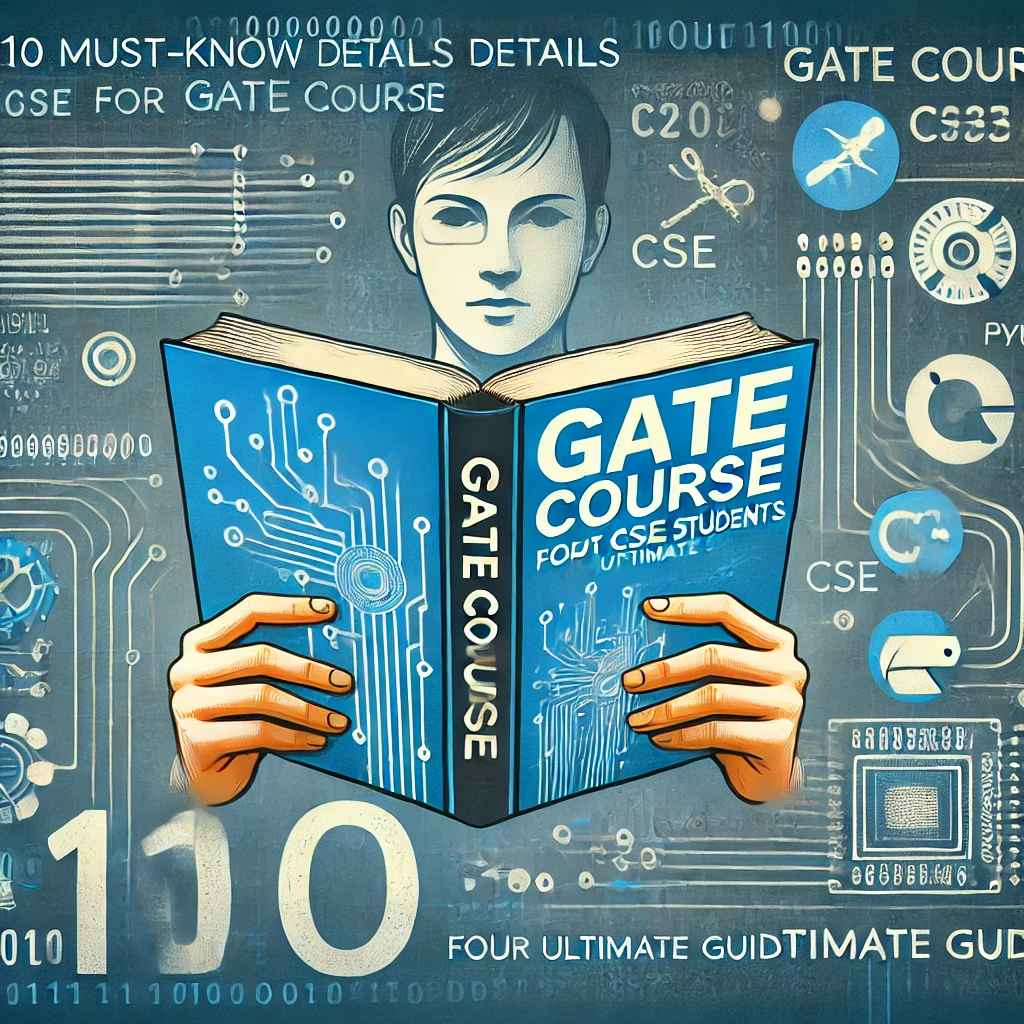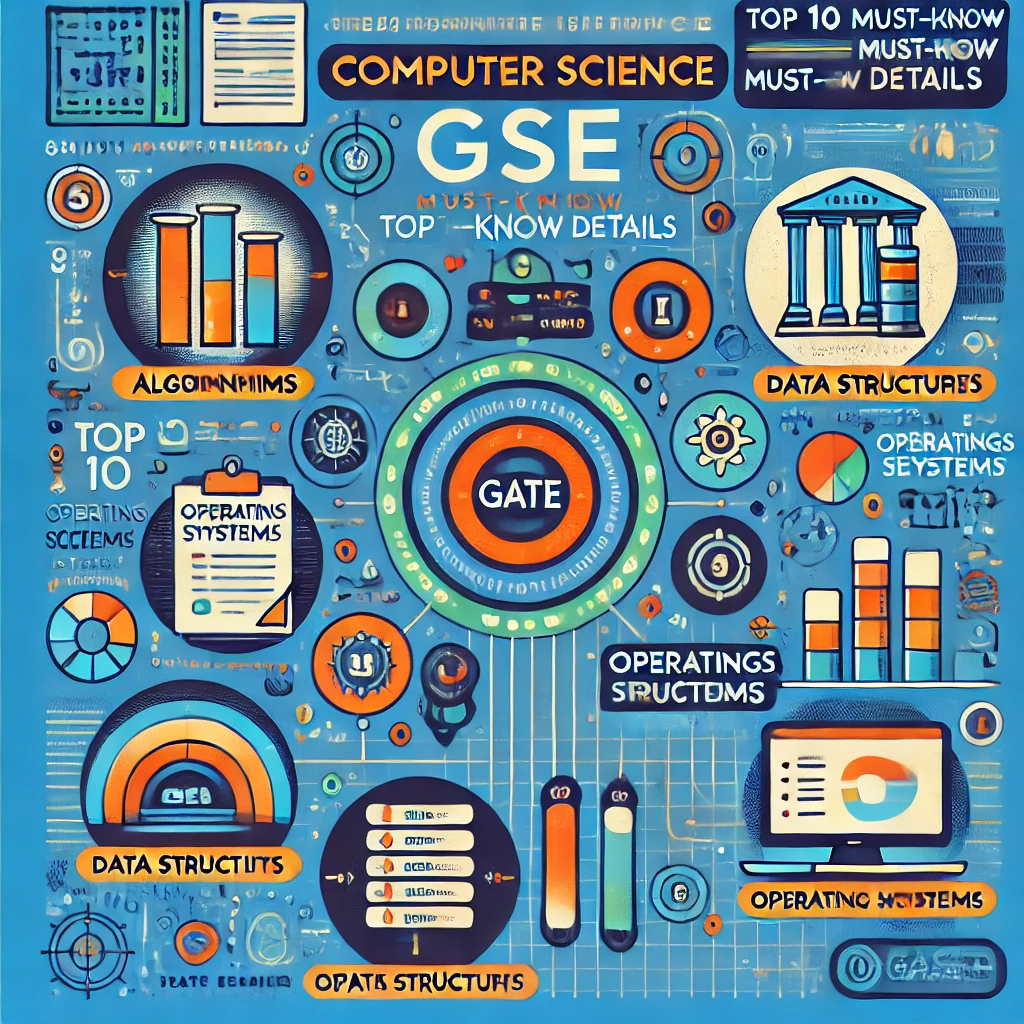GATE Course for CSE: The Complete Guide for Computer Science Aspirants
The GATE course for CSE (Computer Science and Engineering) is an essential pathway for engineering graduates aiming for higher studies or prestigious jobs in public sector undertakings (PSUs). If you’re a CSE student preparing for the Graduate Aptitude Test in Engineering (GATE), this guide will provide all the insights you need to ace the exam, from choosing the right course to mastering core subjects.
What is GATE and Why is it Important for CSE?
The GATE exam is one of the most competitive and sought-after exams for engineering students in India, particularly for those in Computer Science (CSE). It is conducted jointly by the Indian Institute of Science (IISc) and seven Indian Institutes of Technology (IITs). The exam assesses the comprehensive understanding of various undergraduate subjects in engineering, and its score is used for:
- Higher Education: Admission to M.Tech, MS, and PhD programs in IITs, NITs, and other prestigious institutions.
- PSU Jobs: Many public sector companies such as ONGC, BHEL, and NTPC recruit candidates based on their GATE scores.
- Research Opportunities: Candidates can apply for research positions in top technology institutions.
Also Read: How Much Does GATE Coaching for CS Usually Cost in India?

How to Choose the Best GATE Course for CSE?
Selecting the right GATE course for CSE is crucial for effective preparation. Here are some factors to consider:
- Experienced Faculty: Look for courses with experienced instructors who specialize in CSE subjects like Algorithms, Data Structures, and Operating Systems.
- Comprehensive Syllabus Coverage: Ensure the course covers all the essential topics outlined in the GATE syllabus, including Theory of Computation, Computer Networks, and Databases.
- Mock Tests and Practice Papers: The best courses provide regular mock tests and practice questions to help you gauge your progress.
- Flexible Learning Options: Online courses offer flexibility, which is ideal for students who are balancing studies with other commitments.
Top Subjects Covered in GATE Course for CSE
To excel in the GATE exam for CSE, students must focus on key subjects that are frequently tested. Here are the core topics:
- Algorithms and Data Structures: Understanding time complexity, sorting algorithms, and advanced data structures like trees and graphs is crucial.
- Operating Systems: Topics such as process scheduling, memory management, and file systems are significant for scoring well.
- Computer Networks: Learn about TCP/IP protocols, network security, and data communication.
- Database Management Systems (DBMS): Focus on SQL queries, normalization, and transaction management.
- Theory of Computation: Dive into automata theory, formal languages, and Turing machines.
Also Read: What Study Materials Are Provided in GATE CS Online Coaching?

Benefits of Enrolling in a GATE Course for CSE
A well-structured GATE course for CSE offers numerous benefits:
- Structured Learning Path: Following a planned curriculum helps you cover the entire syllabus systematically.
- Expert Guidance: Instructors provide valuable tips, strategies, and shortcuts to tackle tricky questions.
- Time Management Skills: The course helps you manage time effectively during preparation and the actual exam.
- Peer Interaction: Engaging with fellow aspirants can boost your preparation and help resolve doubts.
Online vs. Offline GATE Courses for CSE: Which is Better?
With the rise of online education, students now have the option to choose between online and offline GATE courses. Here’s a comparison to help you decide:
| Criteria | Online Course | Offline Course |
|---|---|---|
| Flexibility | High (Study anytime) | Fixed schedule |
| Cost | Generally affordable | Higher fees |
| Study Materials | Digital resources | Physical books and notes |
| Interaction | Virtual doubt-solving | Face-to-face interaction |
| Access to Faculty | Online forums, live chats | In-person classes |
Online courses are great for self-motivated learners, while offline courses offer a more traditional classroom experience. Choose based on your learning style and convenience.
Tips for Preparing for GATE CSE
- Understand the Syllabus: Familiarize yourself with the detailed syllabus and focus on high-weightage topics.
- Create a Study Plan: Allocate time for each subject and stick to your schedule.
- Practice Previous Year Papers: Solving past papers helps you understand the exam pattern and difficulty level.
- Join a Test Series: Regular mock tests help you assess your preparation and improve time management.
- Focus on Core Subjects: Prioritize important subjects like Algorithms, Data Structures, and Computer Networks.
Also Read: Which Topics Are Covered in CS GATE Coaching?

FAQs
What is the eligibility criteria for GATE CSE?
The eligibility criteria require a Bachelor’s degree in Engineering, Technology, or Science. Final-year students can also apply.
How many times can I appear for GATE CSE?
There is no restriction on the number of attempts. You can appear as many times as you want.
Is self-study enough for GATE CSE preparation?
While self-study can work, joining a GATE course for CSE offers structured learning and expert guidance.
Which are the best reference books for GATE CSE?
Books like “Introduction to Algorithms” by Cormen, “Operating System Concepts” by Silberschatz, and “Computer Networks” by Tanenbaum are highly recommended.
How important is the GATE score for PSU recruitment?
A good GATE score is crucial for getting shortlisted in PSU job interviews, as it is a primary selection criterion.
Can I prepare for GATE CSE while working?
Yes, many working professionals opt for online GATE courses for CSE, which offer flexibility and allow preparation alongside their job.
Conclusion
The GATE course for CSE is a stepping stone for those aiming to pursue higher studies or secure top jobs in the engineering field. With the right resources, consistent preparation, and a focused study plan, you can achieve your desired score and open up a plethora of opportunities in your career. Whether you choose an online or offline course, make sure it aligns with your learning needs and goals.




















